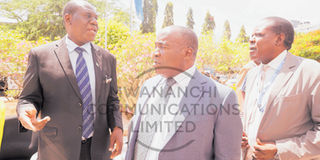Govt faces funding gap of Sh3 trillion

Water and Irrigation permanent secretary Mbogo Futakamba (left) speaks to minister Gerson Lwenge (middle) and Unicef official Kiwe Sebunya in Dar es Salaam yesterday. PHOTO | SALIM SHAO
What you need to know:
- The permanent secretary in the Ministry of Water and Irrigation, Mr Mbogo Futakamba, told the 11th WSDP meeting in the city yesterday that while the amount for financing the second phase of the programme was estimated at $3.3 billion, the committed funds from donors was $2.2 billion, showing a shortfall of $1.2 billion (Sh2.6 trillion).
Dar es Salaam. The government is facing an uphill task of bridging a gap of $1.2 billion (Sh2.6 trillion) of financing the delayed second phase of Water Sector Development Programme (WSDP II).
The permanent secretary in the Ministry of Water and Irrigation, Mr Mbogo Futakamba, told the 11th WSDP meeting in the city yesterday that while the amount for financing the second phase of the programme was estimated at $3.3 billion, the committed funds from donors was $2.2 billion, showing a shortfall of $1.2 billion (Sh2.6 trillion).
“We are today set to dialogue on how this funding gap will be tackled to finance the second phase of Water Sector Development Programme. Already, 30 investors have shown interest but we need participation of more companies to fill the gap,” said Mr Futakamba.
According to him, the first phase of WSDP which started in 2007 was supposed to be completed in 2014 but due to financial constraints, it was extended to the end of last year and re-extended further to this year. WSDII started in July this year.
The minister for Water and Irrigation, Mr Gerson Lwenge, said so far, 86 per cent of the urban population has access to clean water.
In the rural areas, the rate is 72 per cent.
“Our goal is to attain 100 per cent accessibility level for rural and urban dwellers by 2025,” he said.
However, a representative of civil society organisations, Ms Josephine Lemoyan, said apart from an increase in financial constraints in the sector, inequities in the provision of water services, poor project management, low participation of private sector and local communities, unmet commitments and delayed donor funds have become chronic.




